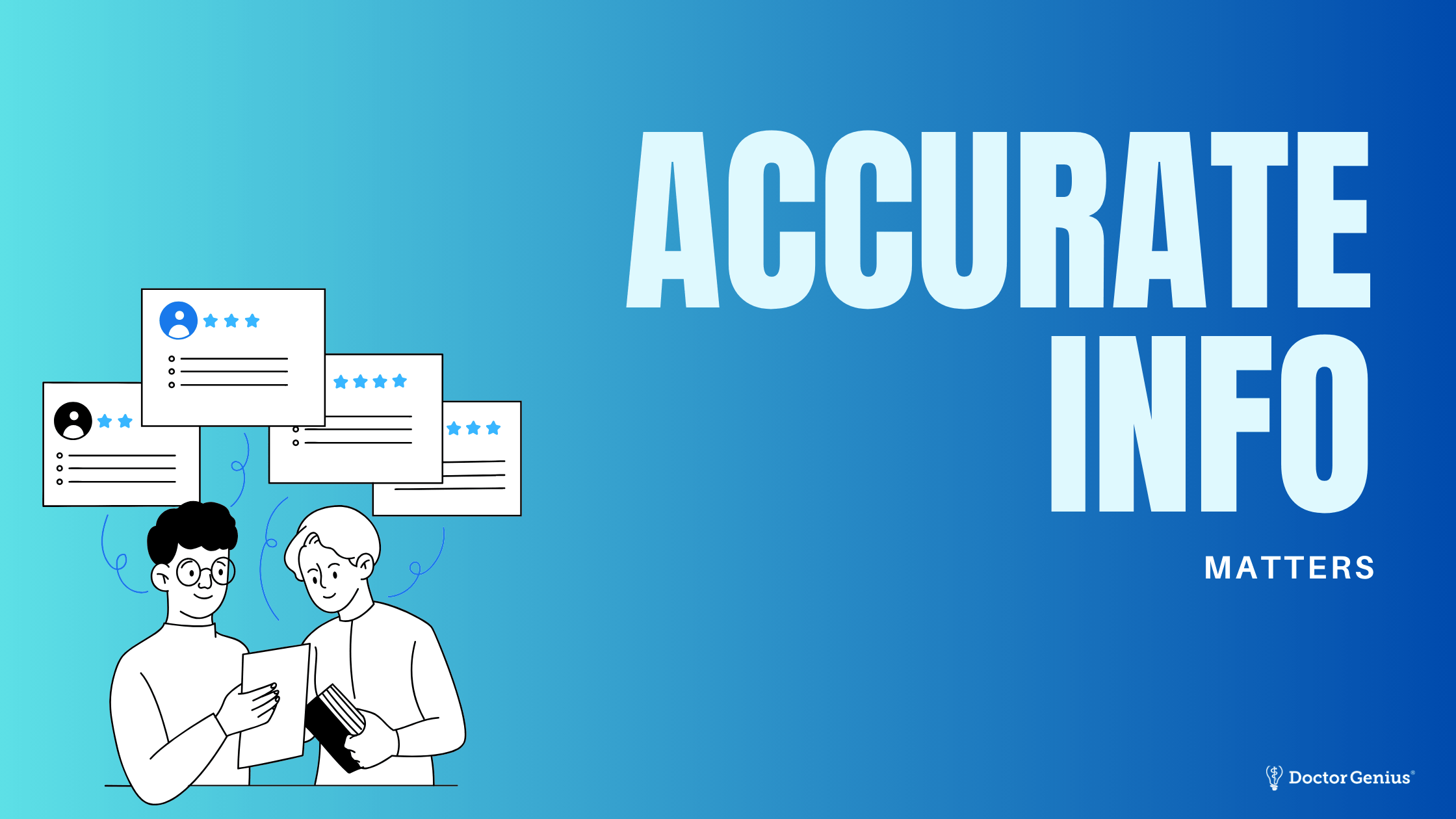Factual information is the backbone of a reliable and trustworthy website. It is the foundation on which users build their knowledge and make decisions about their everyday lives. Whether your practice launched its website a decade ago or a week ago, it is important to remember that maintaining accurate information and ensuring it is up-to-date is an ongoing process.
Building trust and credibility
Having factual information on a website establishes trust and credibility with both patients and search engines. Users visit websites expecting that the content presented is accurate and reliable. When they find factual information on a website, it creates a positive impression, leading to increased trust in the source. However, if they find a website with incorrect or outdated information, they will likely lose confidence in the practice and find another site with the answers they seek. Identifying and removing articles that are outdated, irrelevant, or no longer accurate can help establish credibility, keeping users on the website longer and turning them into patients or clients.
Combating the spread of misinformation
Information has consequences. It can be a lifesaver when true, but untrue information can cause great harm. Similar to an illness, false information can spread and cause what is known as an infodemic. The World Health Organization (WHO) defined the term infodemic as an over-abundance of information—some accurate and some not—that makes it difficult for people to find trustworthy sources and reliable advice when they need it.
Misinformation and disinformation on the Internet spread rapidly and impact personal and public health. Misinformation refers to false or inaccurate information that is unintentionally spread. In contrast, disinformation involves deliberately creating and sharing false or misleading information to deceive or manipulate people.
Doctor Genius prioritizes using factual and relevant information. We fact-check and cross-check information through multiple edits before publishing any content on our or our clients’ websites. We also audit existing content to ensure that the information is still relevant and contains no dead links — hyperlinks that no longer work due to website updates or permanent source removal. This not only benefits our clients but also contributes to the overall health of digital discourse and media literacy.
Enhancing SEO and Search Rankings
Search engines like Google prioritize websites that provide accurate and relevant information. Their algorithms are designed to identify and promote informative, reliable content that aligns with the user’s web search. Factual information with new and updated sources improves a website’s search engine optimization (SEO) and enhances its visibility to those searching for trustworthy and accessible content.
Websites that consistently produce factual information and continuously update sources are more likely to rank higher in search results, gaining a larger audience. This higher ranking increases the website’s influence and reach, contributing to a positive cycle of accurate information that leads to higher visibility and credibility.
Informed decision making
Whether researching symptoms of a health condition or looking for information about a certain treatment, accurate information is essential to help people make informed decisions about their health. Websites that prioritize factual content contribute to more informed patients, where they can make decisions based on knowledge rather than misinformation.
Consider a scenario where a patient who was recently diagnosed with cancer and is researching treatment options. If the treatment information on a practitioner’s website is accurate and transparent, the patient can make a confident decision. In contrast, if the information is misleading or false, it not only harms the patient’s outlook on treatment but also tarnishes the reputation of the practitioner and their website.
How to identify reliable information
With an abundance of information on the Internet, much of it biased, misleading, or incorrect, it is important to determine whether a source is reliable. To do this, use the following criteria:
- Authority: Look into the author or organization publishing the information. What are their credentials? Do they have a background in the field they are writing about?
- Accuracy: Compare the author’s information with proven reliable sources. Do they provide proper citations? Is the information skewed or biased, and if so, does it affect their conclusions about the topic? Do credible people in the field share this same information?
- Coverage: Is the information relevant to the topic you are presenting on the website? Does it fit your needs?
- Currency: Is the topic constantly evolving and updating? For example, medical research and innovation require up-to-date sources.
How Doctor Genius uses factual information on your website
While everyone should learn how to find and vet factual information online, it is especially important for healthcare providers to provide up-to-date sources and content on their websites. Doctor Genius has a strict and thorough process to ensure our clients’ websites contain factual information backed by trustworthy medical and scientific sources. If you want to learn how Doctor Genius uses reliable sources for your website, reach out to us today.
Doctor Genius, located at 16800 Aston Street, Suite 270, Irvine, CA 92606, provides a range of services for practice success. We seek to meet our clients’ needs by providing a variety of marketing, SEO, practice optimization tools, and coaching to transform the healthcare experience. Though we work to provide the most accurate information, the content found on this website is solely intended for entertainment purposes. Therefore, we cannot guarantee that the information provided is entirely correct. You may not use the information on this site to cure, prevent, or diagnose a perceived medical issue. If you have healthcare-related needs, please speak directly to a healthcare professional. Never self-perform medical treatments discussed on this website. All images displayed are also for entertainment purposes only, and personal experiences may differ. Please note that the business tactics mentioned on this site might not be applicable to your industry or practice.

